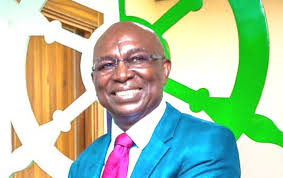One of the last official assignments of the immediate past Customs Comptroller General, Alhaji Hamman Bello Ahmed was the stakeholders’ meeting on port congestion which held in Lagos on January 13, 2009. The meeting was at the instance of the two ministers in charge of transportation and finance, Alhaji Ibrahim Bio and Dr Mansour Mukhtar, respectively.
At the meeting, majority of importers and their licensed customs agents placed the blame for port congestion at the doorstep of the Nigeria Customs Service under the then- leadership of Hamman Ahmed.
They blamed the current fate that has befallen thousands of imported containers on circular 026/2008 of the Customs and held the former Customs boss responsible. They argued that if the circular had not been issued, there would not have been any need for importers to shy away from taking possession and if they had not shied away, there would not be congestion in Lagos ports.
To tackle the problem of congestion in Lagos ports, it was decided that a task force should be created and given 60 days within which consignees who have containers in the ports should come forward, pay a token as penalty and take their consignments away from the ports.
The task force has since swung into action and everyone is eager to see how its work will impact on the port system, even as some members of the shipping community are already kicking against the modus operandi of its activities.
Going by the communiqué which emanated from the stakeholders’ meeting and which gave rise to the task force, it is expected to sit for 60 days and free the ports of thousands of containers.
Even though the task force is starting a clear one week behind schedule, we state that going by the calibre of members of the committee and especially its chairman, Assistant Comptroller General Nathaniel Iheanacho one can express optimism that it will do a good job.
It is also quite commendable that the Nigeria Customs Service has done well enough in the area of publicity for the 60-day exercise and we expect that importers will seize the opportunity to take delivery of their consignments; majority of which actually violated import guidelines.
We also note the position of licensed customs agents on the controversial circular 026 of the Customs, especially the call for its withdrawal, but we advise that licensed customs agents should first take advantage of the opportunity of the task force and later canvass for the abrogation of the circular.
The perceived conflict between the controversial circular, the import guidelines and the extant Customs and Excise Management Act (CEMA) should also attract the attention of the federal government.
The persistent opposition to circular 026 which tends to uphold the sanctity of CEMA above the 24-page federal ministry of finance “import guidelines, procedures and documentation requirements under the destination inspection scheme in Nigeria” is both a matter of law and integrity.
We think that it is wrong for the government to jettison its own guidelines on imports mid-way into the implementation of destination inspection of imports. The circumvention of scanning and issuance of risk assessment report (RAR) is either a confirmation of the failure of destination inspection scheme or a tactical negation of the principles guiding the scheme. This is so because, both scanning, issuance of RAR are components of the scheme.
The fact that the task force will subject the container to 100 per cent examination confirms two things: one is that Nigerian importers are yet to imbibe tenets of integrity in business and two; the destination inspection scheme itself needs a reappraisal.
We think that importers and their agents should go before the task force, pay the penalty and proceed to take delivery of their consignments, even as they proceed with pursuing their grievances and seek withdrawal of the contentious of circular 026 of 2008.
By and large, we are convinced that since the task force is an ad-hoc measure and a child of circumstances, it should been seen as such while stakeholders in the port system embrace integrity and best practices.
Sesan Onileimo (FNIS)
















Discussion about this post